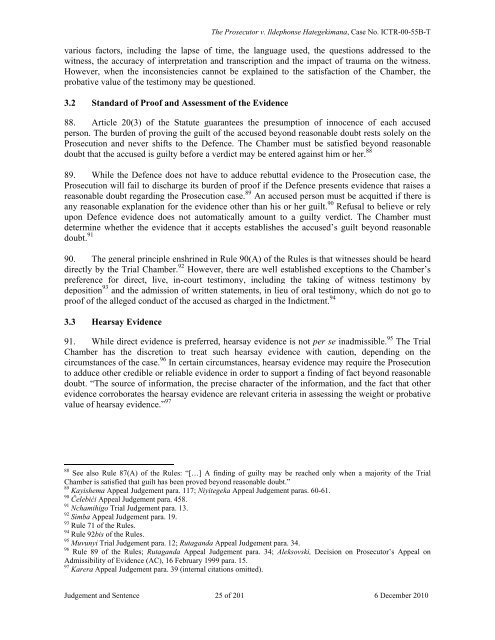Hategekimana - JUDGEMENT & SENTENCE - Refworld
Hategekimana - JUDGEMENT & SENTENCE - Refworld
Hategekimana - JUDGEMENT & SENTENCE - Refworld
You also want an ePaper? Increase the reach of your titles
YUMPU automatically turns print PDFs into web optimized ePapers that Google loves.
The Prosecutor v. Ildephonse <strong>Hategekimana</strong>, Case No. ICTR-00-55B-T<br />
various factors, including the lapse of time, the language used, the questions addressed to the<br />
witness, the accuracy of interpretation and transcription and the impact of trauma on the witness.<br />
However, when the inconsistencies cannot be explained to the satisfaction of the Chamber, the<br />
probative value of the testimony may be questioned.<br />
3.2 Standard of Proof and Assessment of the Evidence<br />
88. Article 20(3) of the Statute guarantees the presumption of innocence of each accused<br />
person. The burden of proving the guilt of the accused beyond reasonable doubt rests solely on the<br />
Prosecution and never shifts to the Defence. The Chamber must be satisfied beyond reasonable<br />
doubt that the accused is guilty before a verdict may be entered against him or her. 88<br />
89. While the Defence does not have to adduce rebuttal evidence to the Prosecution case, the<br />
Prosecution will fail to discharge its burden of proof if the Defence presents evidence that raises a<br />
reasonable doubt regarding the Prosecution case. 89 An accused person must be acquitted if there is<br />
any reasonable explanation for the evidence other than his or her guilt. 90 Refusal to believe or rely<br />
upon Defence evidence does not automatically amount to a guilty verdict. The Chamber must<br />
determine whether the evidence that it accepts establishes the accused’s guilt beyond reasonable<br />
doubt. 91<br />
90. The general principle enshrined in Rule 90(A) of the Rules is that witnesses should be heard<br />
directly by the Trial Chamber. 92 However, there are well established exceptions to the Chamber’s<br />
preference for direct, live, in-court testimony, including the taking of witness testimony by<br />
deposition 93 and the admission of written statements, in lieu of oral testimony, which do not go to<br />
proof of the alleged conduct of the accused as charged in the Indictment. 94<br />
3.3 Hearsay Evidence<br />
91. While direct evidence is preferred, hearsay evidence is not per se inadmissible. 95 The Trial<br />
Chamber has the discretion to treat such hearsay evidence with caution, depending on the<br />
circumstances of the case. 96 In certain circumstances, hearsay evidence may require the Prosecution<br />
to adduce other credible or reliable evidence in order to support a finding of fact beyond reasonable<br />
doubt. “The source of information, the precise character of the information, and the fact that other<br />
evidence corroborates the hearsay evidence are relevant criteria in assessing the weight or probative<br />
value of hearsay evidence.” 97<br />
88 See also Rule 87(A) of the Rules: “[…] A finding of guilty may be reached only when a majority of the Trial<br />
Chamber is satisfied that guilt has been proved beyond reasonable doubt.”<br />
89 Kayishema Appeal Judgement para. 117; Niyitegeka Appeal Judgement paras. 60-61.<br />
90 Čelebići Appeal Judgement para. 458.<br />
91 Nchamihigo Trial Judgement para. 13.<br />
92 Simba Appeal Judgement para. 19.<br />
93 Rule 71 of the Rules.<br />
94 Rule 92bis of the Rules.<br />
95 Muvunyi Trial Judgement para. 12; Rutaganda Appeal Judgement para. 34.<br />
96 Rule 89 of the Rules; Rutaganda Appeal Judgement para. 34; Aleksovski, Decision on Prosecutor’s Appeal on<br />
Admissibility of Evidence (AC), 16 February 1999 para. 15.<br />
97 Karera Appeal Judgement para. 39 (internal citations omitted).<br />
Judgement and Sentence 25 of 201 6 December 2010

















